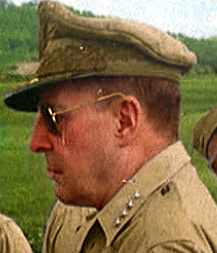
Background of news –
Democrats united on fourth term
By Jay G. Hayden, North American Newspaper Alliance
Washington –
One thing unmistakably demonstrated in the Democratic 1944 campaign curtain-raiser on Saturday is that President Roosevelt either must accept a fourth nomination or leave his party so hopelessly debilitated as to be unable even to stir up a respectable scrap within its own ranks.
Judged by the flood of individual and group complaints it has been receiving, the party high command expected trouble from several directions.
A group of Midwesterners, headed by James C. Quigley of Nebraska, staged a rumpus at the National Committee meeting in Chicago last year and arrived for the present session ahead of time ostensibly to repeat this performance.
Early last week, also, a flock of Southern governors came to town, breathing fire and brimstone against alleged federal discriminations affecting their section. In this group were several governors who had talked openly of the possibility of Southern bolt against a fourth term.
President Roosevelt’s call for a national service act to end strikes seemingly had antagonized all but an extreme left wing of organized labor.
Farley attends session
Most disturbing of all to the party managers must have been the news that James A. Farley, leader of Democratic opposition to the third term and reported even more opposed to a fourth, had slipped into the headquarters hotel and was busily finagling among the committeemen.
What eventuated from these rumblings of dissension?
Exactly nothing. The supposed Western insurgents were the first of all to plunk for a fourth term. The Southern governors left town, if not placated at least effectually silenced. If dissident labor unionists and farmers were present, they did not disclose themselves by even so much as an off-key peep. Mr. Farley left before the formal meeting began, tiptoeing, as he came.
The reason for all this abnegation is plain enough. It is that Democratic aspirants for office, from would-be Vice Presidents of the United Staters down to town constables, cannot discern a glimmer of 1944 hope anywhere except in another ride on Mr. Roosevelt’s coattails.
The kingpin of all present abnegators is Vice President Henry A. Wallace, Mr. Garner probably could have had a third vice presidential nomination if he had continued to play a harmonious second fiddle. But not so Mr. Wallace. The skidoo sign was handed him quietly several months ago, and at the Jackson Day dinner it was hung out for everybody to see.
The Rayburn-Wallace byplay
With the President absent the top billing for this gatherings logically should have gone to the Vice President. Instead, Speaker Sam Rayburn got it and he, all along, has been touted as the man Mr. Roosevelt had picked for his 1944 running mate.
This play between Messrs. Wallace and Rayburn was easily the most intriguing feature of the Jackson Day program, and it also may be indicative of one intra-Democratic danger lying ahead for the President.
While Mr. Rayburn monopolized the radio time with a speech strictly in Mr. Roosevelt’s new “Win-the-War” mold, Mr. Wallace clung to the cast-off “New Deal” and played it for all it was worth.
He asserted:
The New Deal is not dead. If it was dead, the Democratic Party would be dead, and well dead… The New Deal is Franklin D. Roosevelt.
Mr. Wallace, like every other Democratic office seeker, is plainly hanging on for dear life to Mr. Roosevelt’s coattails, but also he is hanging on to the “New Deal” policies with all of their old-time implication respecting organized labor, impecunious farmers and “big business” villains.
Implied in Mr. Wallace’s remarks is just the suspicion of a threat that if he is finally shoved from his coattail perch, a lot of other New Deal supporters may slide off with him.
